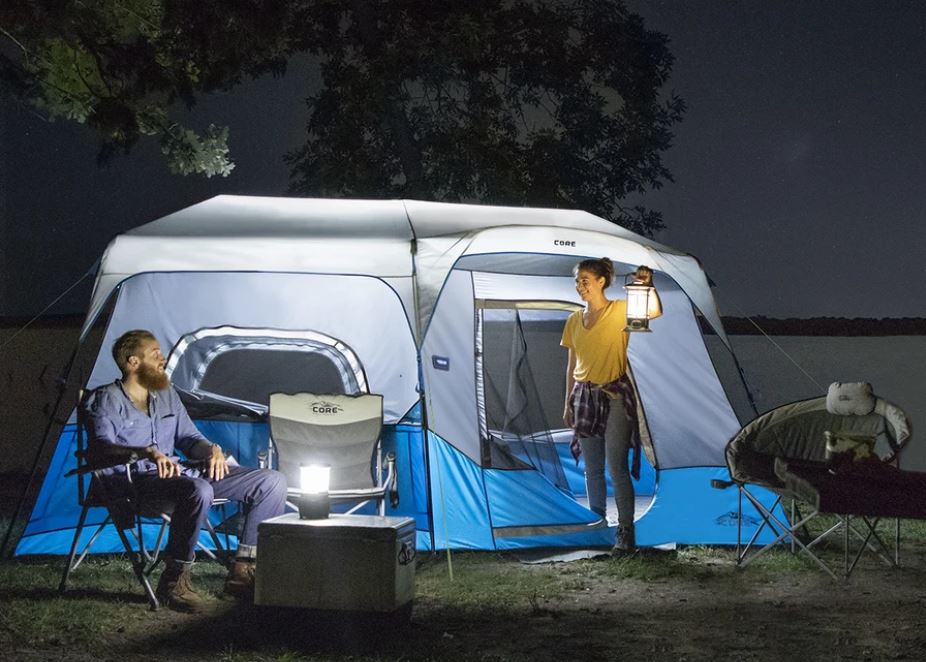Congratulations! If you’re here to learn about camping tent footprints, then you’re most likely looking to improve upon your camping experiences, or you’re gearing up for your very first one! Or maybe you’re just avoiding work. Whatever the reason, we’re glad you’re here.
 First off, there are two different definitions for a footprint. A tent’s footprint is the area it takes up on the ground. A tent footprint, sometimes called a groundsheet or a ground cloth, is a durable, waterproof barrier that goes between a tent and the ground. This is the one we’re going to be talking about. If it sounds pretty simple, it is. But that doesn’t mean it’s not important. Like setting out to make a PB&J and discovering you’re all out of J. You need the J.
First off, there are two different definitions for a footprint. A tent’s footprint is the area it takes up on the ground. A tent footprint, sometimes called a groundsheet or a ground cloth, is a durable, waterproof barrier that goes between a tent and the ground. This is the one we’re going to be talking about. If it sounds pretty simple, it is. But that doesn’t mean it’s not important. Like setting out to make a PB&J and discovering you’re all out of J. You need the J.
 So why is a footprint for your camping tent important? One of the best arguments for a footprint is that it helps to preserve the floor of your tent. No part of your tent takes a bigger beating than the floor. Tent floors are designed to be durable. Still, rocks, sticks, and anything else under your tent can wear away at it over time, causing holes and affecting its water-resistant capabilities. A tent footprint can greatly reduce the wear on a tent floor. Sure, the footprint may experience some wear over time, but it’s a lot cheaper to replace a footprint than a whole tent. Kind of like it’s cheaper to buy a quality phone case than it is to replace a whole phone which never should’ve been left on the roof of the car and gotten run over in the first place.
So why is a footprint for your camping tent important? One of the best arguments for a footprint is that it helps to preserve the floor of your tent. No part of your tent takes a bigger beating than the floor. Tent floors are designed to be durable. Still, rocks, sticks, and anything else under your tent can wear away at it over time, causing holes and affecting its water-resistant capabilities. A tent footprint can greatly reduce the wear on a tent floor. Sure, the footprint may experience some wear over time, but it’s a lot cheaper to replace a footprint than a whole tent. Kind of like it’s cheaper to buy a quality phone case than it is to replace a whole phone which never should’ve been left on the roof of the car and gotten run over in the first place.
Another reason for a footprint is to add an additional waterproof barrier between you and the ground. Though your tent floor should be able to ward off most moisture, it never hurts to have an extra layer of protection should conditions get soggier than you had expected. Now, you might walk around the campground and see some tents with footprints sticking out from underneath them. This is bad. Don’t do this. And if you’ve ever done this, hold out one of your hands, then slap it with the other one. The footprint should be smaller than the floor of the tent. Typically, an inch or two smaller on all sides. If the footprint sticks out, it can catch rainwater and channel it under the tent. Unless you’re nostalgic for the 1980’s era waterbeds that would sometimes spring leaks, you don’t want this.
 Lastly, a footprint will help to keep the bottom of your tent clean. Why should you worry about keeping something clean that you never see? Like the top of your refrigerator? It has to do with storing your tent. You never want to store dirty gear. Not only can dirt and debris cause premature wear and tear, but it’s never fun to unpack your gear for a new trip and find that it’s still dirty from the last one. If you can keep the bottom of your tent from getting dirty, then that’s one less thing you have to clean.
Lastly, a footprint will help to keep the bottom of your tent clean. Why should you worry about keeping something clean that you never see? Like the top of your refrigerator? It has to do with storing your tent. You never want to store dirty gear. Not only can dirt and debris cause premature wear and tear, but it’s never fun to unpack your gear for a new trip and find that it’s still dirty from the last one. If you can keep the bottom of your tent from getting dirty, then that’s one less thing you have to clean.
So, a tent footprint can help to keep your tent floor protected, dry, and clean. Which is really a pretty good practice for most things that don’t live in water. And now it’s off to the store to buy some J. We need the J.
If you have a CORE Equipment tent, we carry a selection of compatible tent footprints.
If you’re shopping for camping tents, please see our entire line of CORE Equipment camping tents.




